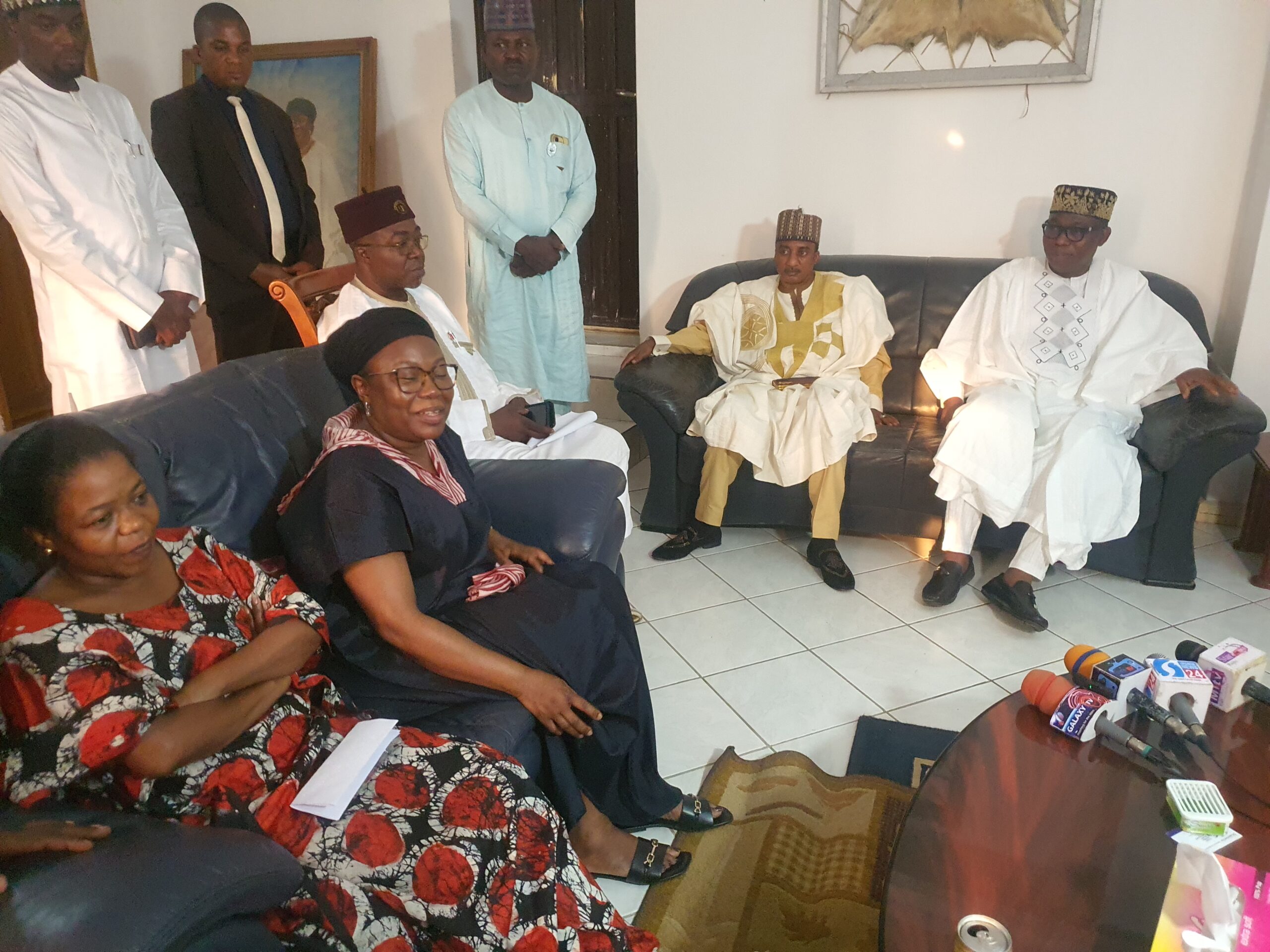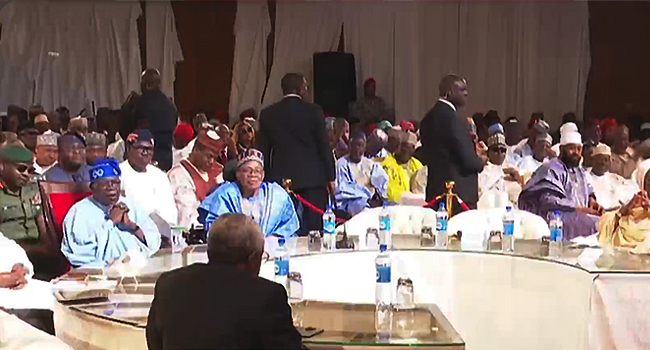News
General Useni: A Legacy of Justice, Compassion in Uniform, Adebayo Reflects

The Social Democratic Party (SDP), led by its 2023 presidential candidate, Prince Adewale Adebayo, has paid glowing tributes to the late General Jeremiah Useni, describing him as more than just a soldier but a symbol of justice, compassion, and leadership.
During a condolence visit to the Useni family in Maitama, Abuja, over the weekend, Adebayo shared heartfelt stories that underscored the General’s unique legacy as a military officer who wielded power with integrity and humanity.
“It’s rare to find an angel in army uniform, but that’s what General Useni was,” Adebayo stated. He recounted the General’s calm approach to crisis situations, particularly during a tense period in Ife, where, instead of resorting to violence, Useni simply displayed the bullets in his possession and made it clear he had no desire to use them. “That’s all it took—the troublemakers dispersed peacefully,” Adebayo noted, illustrating the General’s philosophy of peace over aggression.
Beyond his military service, General Useni’s tenure as Minister of the Federal Capital Territory (FCT) earned him the nickname “The People’s General.” Adebayo praised Useni’s inclusive approach to governance, emphasizing how he prioritized the well-being of everyday Nigerians.
“Whether you were selling chewing gum or yams, he found space for you in Abuja. He didn’t demolish homes recklessly; he relocated people with dignity,” Adebayo said, highlighting Useni’s efforts to transform the capital into a city for all, not just the elite.
Adebayo also shared a recent conversation with the General, just weeks before his passing. Despite his declining health, Useni remained focused on offering wisdom and encouragement. “When I told him I was running for president, he didn’t care whether he knew me personally. He said, ‘Think of the country first. If you don’t get it, don’t make trouble. In my time, I let it be, and in God’s time, you will get it.’”
Useni’s military career spanned critical periods in Nigeria’s history—from the 1966 coup to the transition to democracy in the late 1990s. Despite opportunities to seize power, Useni consistently chose stability over personal ambition. “Weaker men would have politicized it,” Adebayo noted, “but Useni accepted the will of God and prioritized the nation’s unity.”
SDP National Chairman, Shehu Gabam, echoed Adebayo’s sentiments, describing Useni as “a soldier who wore justice like a uniform.” Gabam highlighted Useni’s unwavering commitment to fairness and his ability to lead with compassion in an era often marred by authoritarianism.
“General Useni was more than a soldier; he was a unifier, a peacemaker, and a man whose life was defined by integrity,” Gabam stated. He revisited the Ife crisis, emphasizing how Useni’s peaceful approach to conflict resolution was emblematic of his leadership style. “His words carried more weight than any weapon. He didn’t seek to intimidate but to persuade through logic and empathy.”
Gabam also reflected on Useni’s time as FCT Minister, where he ensured equitable treatment for all residents, regardless of their social status. “Abuja was not just a city for the elite under his watch. Whether you were a street vendor or a landowner, he made sure everyone had a place,” Gabam remarked.
Useni’s political wisdom extended beyond his military and ministerial roles. Gabam recalled how the General offered him similar advice when he shared his political aspirations: “Think of Nigeria first. If you don’t succeed, don’t cause trouble. Trust in God’s timing.”
Throughout his career, General Useni demonstrated that true leadership lies in restraint and service. Gabam emphasized that while many saw opportunities for personal gain during times of political upheaval, Useni remained steadfast in his commitment to peace and democracy.
“Where others saw a chance to seize power, he saw a duty to protect the nation’s unity,” Gabam said. “His life is a testament to the fact that true power lies not in domination, but in justice and compassion.”
General Useni’s influence was felt far beyond the barracks and government offices. His legacy serves as a reminder that leadership is not about wielding authority for personal benefit but about serving the people with integrity and humility.
“We will miss him dearly,” Gabam concluded, “but his spirit will continue to guide us as we strive to build a Nigeria that reflects the values he lived and died for.”
Responding on behalf of the family, Mrs. Julcit Bali, General Useni’s first daughter, described her father as “a giver to a fault,” recalling how he continued to support others even while on his hospital bed. “His life was one of selfless service, and we are grateful for the love and respect shown to him by so many,” she said.
As the nation mourns the passing of General Jeremiah Useni, his life remains a beacon of justice, compassion, and leadership, leaving an indelible mark on Nigeria’s history and future.
News
After over 3 decades, IBB Admits victory of Abiola in June 12, 1993 Election

Over three decades after annulling the acclaimed freest and fairest June 12, 1993, presidential election, former Head of State Ibrahim Babangida has, publicly admitted that the late Moshood Kashimawo Olawale (MKO) Abiola won the poll.
Babangida’s newly launched 420-page memoir, A Journey in Service: An Autobiography of Ibrahim Babangida, unveiled in Abuja on Thursday, made the disclosure.
The event was attended by prominent figures from across Nigeria and beyond.
In his book, Babangida, widely known as IBB, admitted that his earlier claims suggesting Abiola might not have won were incorrect.
“Upon further reflection and a closer examination of all available facts—particularly the detailed election results published as an appendix to this book—it is clear that MKO Abiola won the June 12 election,” he wrote.
He cited official figures from the 110 polling booths nationwide, showing that Abiola secured 8,128,720 votes against his main challenger Bashir Tofa’s 5,848,247 votes. Abiola also met the constitutional requirement of securing one-third of votes cast in at least 28 states, including Abuja.
In what appears to be contradiction after confirming Abiola’s victory, Babangida maintained that the annulment was done in “extreme national interest.”
“As the leader of the military administration, I accept full responsibility for all decisions taken under my watch. Mistakes, oversights, and missteps happened in quick succession, but I affirm in my book that every decision, including June 12, was made to ensure Nigeria’s survival,” he stated.
The annulment, which remains one of Nigeria’s most controversial political decisions, triggered nationwide protests and unrest. Following the backlash, Babangida resigned in August 1993, handing power to an interim government led by businessman Ernest Shonekan. However, within three months, General Sani Abacha overthrew Shonekan in a palace coup.
Refusing to let his mandate be stolen, Abiola declared himself president in 1994, leading to his arrest by Abacha’s military regime. He remained imprisoned until his death under suspicious circumstances on July 7, 1998, a month after Abacha himself died. His wife, Kudirat Abiola, was also assassinated in 1996.
The return to democracy in 1999, which saw former military ruler Olusegun Obasanjo elected as president, marked the beginning of the Fourth Republic. However, the controversy surrounding June 12 remained a major topic in Nigerian politics.
In 2018, then-President Muhammadu Buhari sought to address the injustice by declaring June 12 as Nigeria’s official Democracy Day, replacing May 29. He also posthumously honored Abiola as a former president.
Reflecting on these events in his memoir, Babangida expressed regret over how the situation unfolded.
“Looking back, the June 12 saga was the most challenging moment of my life and, in some respects, one of the most painful. If I had to do it again, I would do it differently,” he wrote.
Babangida’s book launch was attended by an array of high-profile figures, including former Presidents Goodluck Jonathan, Yakubu Gowon, and Abdulsalami Abubakar, as well as former Vice Presidents Atiku Abubakar and Namadi Sambo.
President Bola Tinubu and Vice President Kashim Shettima were also present, alongside billionaire business moguls Aliko Dangote, Abdulsamad Rabiu, and Folorunsho Alakija.
News
Osun on Edge: Timi Frank Warns of APC Plot to Force State of Emergency

Political tension is at a boiling point in Osun State as violent clashes between supporters of the ruling Peoples Democratic Party (PDP) and the opposition All Progressives Congress (APC) over local government control turn deadly.
Amid the unrest, former APC Deputy National Publicity Secretary, Comrade Timi Frank, has sounded the alarm, accusing the APC of orchestrating chaos to justify a federal takeover of the state.
In a strongly worded statement issued on Monday, Frank called on President Bola Tinubu to intervene and rein in Minister of Marine and Blue Economy and former Governor Gboyega Oyetola, whom he accuses of fueling the crisis. According to Frank, Oyetola and his allies are deliberately stoking violence in a bid to make Osun ungovernable for Governor Ademola Adeleke, creating grounds for a state of emergency declaration.
“Their major target is to declare a state of emergency because they know that if elections are held today, Governor Adeleke will still win,” Frank stated. “So they want to abort his second term through crisis and violence.”
The crisis stems from a contentious Court of Appeal ruling, which both the APC and PDP interpret differently regarding the reinstatement of sacked local government chairmen. While Governor Adeleke has insisted that security concerns make their return impossible, Oyetola has vowed to enforce the ruling through legal channels.
The APC National Secretary, Dr. Ajibola Basiru, escalated tensions further by suggesting on live television that the Federal Government should consider declaring a state of emergency in Osun to curb the violence.
Frank, however, sees this as a calculated move to use federal might to undermine Adeleke’s administration.
“We call on the people of Osun to stand with Governor Adeleke and resist this political coup disguised as a crisis,” Frank urged. “This is nothing but an attempt to take Osun by force because APC knows they can’t win the state through the ballot box.”
As uncertainty looms, Osun residents watch closely to see whether the Federal Government will step in to douse the flames or if the crisis will spiral further, threatening the state’s stability.
News
At 2025 Munich Security Conference, Natasha champions Call for Gender Equity

Chairperson of the Senate Committee on Diaspora and NGOs, Senator Natasha Akpoti Uduaghan, has called for greater gender equity in global security and governance.
She made this strong appeal at the 2025 Munich Security Conference (MSC), where she joined world leaders to discuss the challenges facing women in leadership and peacebuilding.
Speaking on a high-profile panel alongside Kosovo’s President Vjosa Osmani, former Finnish Prime Minister Sanna Marin, and EU Commissioner Hadja Lahbib, Akpoti Uduaghan stressed the urgent need for inclusive governance and gender-sensitive security policies.
“The exclusion of women from decision-making isn’t just unfair—it’s a security risk. To build lasting peace, women must not only be at the table but leading the discussions that shape our future.”
A statement from her media office on Sunday in Abuja highlighted the senator’s concerns over the growing global backlash against women’s participation in leadership, warning that this trend threatens long-term stability and development.
Bringing an African perspective to the discussion, Akpoti Uduaghan shed light on the systemic challenges Nigerian women face in politics, ranging from intimidation to exclusion and political violence.
She called for stronger policies to protect women and create an enabling environment for their active participation in governance.
“The backlash against gender inclusivity in politics and security is not just a setback for women; it is a setback for global development.
“The world must move beyond rhetoric and take concrete actions to ensure that women are not just included in peace and security discussions but are given equal opportunities to lead and influence policies.”
The MSC panel, moderated by a senior policy expert, saw a robust exchange of ideas on gender-based discrimination, political violence, and the role of women in conflict resolution.
President Osmani shared insights from Kosovo’s experience in advancing women’s leadership.
Sanna Marin pointed to the Nordic model of gender inclusivity as a global benchmark.
Commissioner Lahbib reaffirmed the EU’s commitment to integrating women in crisis preparedness and security frameworks.
As the conference wrapped up, there was a unanimous agreement that reversing gender regression requires policy reforms, international cooperation, and sustained efforts to empower women in governance and security.
Senator Akpoti Uduaghan’s participation at MSC 2025 reinforces her growing influence as a global advocate for women’s rights, governance reform, and inclusive security policies. Her message was clear: a just, stable, and peaceful world cannot be achieved without women at the forefront of decision-making.
-

 Crime1 year ago
Crime1 year agoPolice nabs Killer of Varsity Lecturer in Niger
-

 News1 year ago
News1 year agoFCT-IRS tells socialite Aisha Achimugu not to forget to file her annual returns
-

 Appointment1 year ago
Appointment1 year agoTinubu names El-Rufai, Tope Fasua, others in New appointments
-

 Kogi1 year ago
Kogi1 year agoEchocho Challenges Tribunal Judgment ordering rerun in 94 polling units
-

 Kogi1 year ago
Kogi1 year agoINEC cancells election in 67 polling units in Ogori-Magongo in Kogi
-

 News1 year ago
News1 year agoIPOB: Simon Ekpa gives reason for seperatists clamour for Biafra
-

 Metro11 months ago
Metro11 months ago‘Listing Simon Ekpa among wanted persons by Nigeria military is rascality, intimidation’
-

 News1 year ago
News1 year agoKingmakers of Igu/ Koton-Karfe dare Bello, urge him to reverse deposition of Ohimege-Igu
